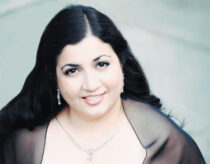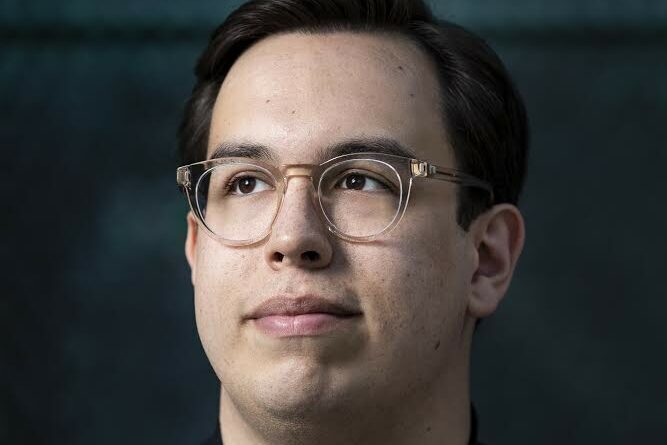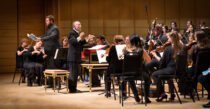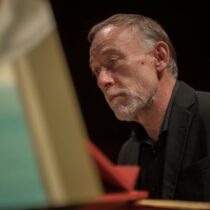The Orpheum
This production is a collaboration with the Vancouver Chamber Choir
Doors open: 6:30 p.m.
Box Office on Dec. 8: Opens 5:30 p.m.
Run time: 130 minutes plus 20 minutes intermission
Please note: Handel’s Messiah is excluded from our subscription ticket offer.
Artists: The Vancouver Chamber Choir & The Pacific Baroque Orchestra with soprano Sherezade Panthaki, alto Allyson McHardy, tenor Nicholas Scott, and bass Jonathon Adams, conducted by Alexander Weiman
In this Messiah production, shepherded by Alexander Weimann, the Vancouver Chamber Choir, the outstanding soloists and the Pacific Baroque Orchestra embark on an inspired spiritual and artistic journey toward a new, vibrant way of unlocking Handel’s most masterful work.
“Even after having conducted this piece a few dozen times, and having played it some hundred times earlier, I am still puzzled how conclusive and coherent it comes to live in performance. It does not have a narrative as we would find in other oratorios, at least not at the surface, and the form is quite unusual. It feels like a novel whose protagonist we never directly meet, but carefully and gently approach through a sequence of portrayals and depictions of their birth, life, suffering, death and legacy, and what all that means to us. In my years of knowing the piece, I have found the Messiah a sacred, but not exclusively religious subject, rather the account of a universal and inclusive human quest.” (Alexander Weimann, March 2023)
Run time: 130 minutes with intermission
This concert is generously sponsored by Dr Katherine Paton, Eric Wyness, Bryan & Gail Atkins, Tama Copithorne, Don & Pat Hudson & The Drance Family


PROGRAMME
George Frideric Handel (1685-1759)
Messiah
PROGRAMME NOTES
“This great work,” wrote the music historian Charles Burney in 1785, “has been heard in all parts of the kingdom with increasing reverence and delight; it has fed the hungry, clothed the naked, fostered the orphan and enriched succeeding managers of Oratorios more than any single musical production in this or any other country.” This is a remarkable career for a piece of music, and a reminder of Messiah’s origins in the eighteenth-century enthusiasm for philanthropy; it was first performed for the “Relief of the Prisoners in the several Gaols, and for the Support of Mercer’s Hospital” in Dublin, and it later became a staple at London’s Foundling Hospital, where a manuscript score (bequeathed to the hospital in Handel’s will) can still be seen today. The history of Messiah embodies an optimism about the ability of art to change the world—and to change people—for the better. “I should be sorry if I have only entertained them,” Handel is said to have responded to a congratulatory patron: “I wish to make them better.” Handel—man of the theatre, opera composer par excellence—was not, I think, disparaging entertainment; his ambition was just that music might (as Cicero said of rhetoric) teach, delight, and move at the same time.
Delight accompanied Messiah from the very beginning. The Dublin premiere was reported to have given “universal Satisfaction to all present,” and the audience, although appropriately “grave & decent” in their demeanor, were “not only pleas’d but affected with the performance.” A certain gravity was suitable to the occasion; Charles Jennens (1700-1773), a serious student of the Bible and amateur of music, had compiled the texts of Messiah with the intention that it be performed during Holy Week (the week preceding Easter), the most solemn time of the liturgical year, during which Christians meditated on redemptive sacrifice, death, and Resurrection.
Many of the details of this first performance have become the stuff of legend—famously, ladies were requested not to wear hooped skirts and gentlemen to leave their swords at home in order to free up more space in the hall—as has the remarkable speed with which Handel composed Messiah in a few weeks during the summer of 1741. The writing of Messiah marked a turning point in his career, after which Handel directed his compositional energies increasingly away from Italian opera and towards English-texted oratorios and anthems. Toward the end of 1741, Handel took his new oratorio with him to Dublin, where he set to work putting on versions of his ode L’Allegro, il Penseroso ed il Moderato, his opera Imeneo, Esther, and a selection of concertos. In the midst of this busy season, the Dublin Journal announced the premiere of “a new Grand Sacred Oratorio, called, The MESSIAH” to take place on April 12th (it was delayed until the 13th) at noon.
The English theatre oratorio occupied a somewhat ambiguous place in British cultural life. Handel had forged the genre several years earlier with Esther (1718, revised in 1720 and 1732), Saul (1738), and Israel in Egypt (1739), drawing on the English tradition of choral odes and anthems, the Italian oratorio genre that he had cultivated with so much verve in his days of travel, the operas that had formerly been his livelihood in London, and—particularly in the case of Messiah—the German practice of composing almost-theatrical Passion settings for Holy Week. Some English critics questioned the propriety of portraying sacred subjects in the profane space of the theatre, but the advocates of oratorio insisted that any venue might be “fit for Praise Divine.” Messiah, as it turned out, was first performed neither in a church nor in a theatre, but rather in a “Music Hall,” a venue specially (and newly) built for the enjoyment of such musical entertainments by a music-loving public. (Handel went on to direct performances of the piece both in theatres and in sacred spaces.) Its first cast of performers was something of a motley crew, including choirboys and cathedral clerks alongside professional actors and handpicked singers familiar to Handel from the London scene.
Compared to other oratorios of its day, Messiah was and is unusual. With its roots in the early seventeenth century, the oratorio typically looked something like a sacred opera, complete with characters and dialogue (and the two musical tools central to opera: aria and recitative), but without being staged and acted. Messiah, as Jennens designed it, tells a story not by way of particular characters, scenes and actions but instead through a collage of texts taken directly (sometimes in slightly altered form) from the Bible. Jennens selected and arranged texts from both the Old Testament (prophets such as Isaiah, Haggai, Malachi, Zechariah, Jeremiah, and Hosea as well as the Psalms) and the New Testament (the Gospels, the epistles of Paul, the book of Revelation) of the Christian Bible to suggest a story of cosmic scope but also of deeply human significance; his Bible-savvy audience would have understood these texts to refer to (in section one) the expectation and birth, (in section two) the suffering, death and resurrection, and (in section three) the Second Coming and promised salvation of the Messiah—that is, mashiyach, the “anointed one” described in the Hebrew scriptures, translated into Greek as christos, Christ.
Messiah continued to evolve as Handel revised it according to the particular conditions of future performances, particularly the ensemble of available soloists. The oratorio spread steadily, first within the United Kingdom and then internationally; in the last few decades of the eighteenth century, it could be heard in Germany and Austria. Mozart encountered Messiah some forty years after it had been written and, in one of those curious intersections of music history, made additions to its orchestration for a new performance. The first two hundred years of Messiah are largely a story of augmentation; as the piece became a beloved mainstay of amateur choral societies and festivals, choirs and orchestras grew ever larger. On the 1859 centenary of Handel’s death, for instance, a gargantuan ensemble of about 2,765 singers and 460 players performed Messiah in London’s Crystal Palace to audiences numbering in the tens of thousands. Considering this tradition, it’s easy to forget that Handel originally scored the oratorio for comparatively modest forces: the standard string ensemble with basso continuo, a group of choristers from the local cathedrals, several soloists, and—very economically deployed—trumpets and drums.
Jennens’s and Handel’s storytelling is implicit, oblique, reliant on shared knowledge and a common spirit, and so Messiah is (somewhat like Bach’s Passions) a vehicle as much for contemplation as for narration. Handel’s music reinforces the communal aspect of this story as well as the importance of personal reflection; as splendid, as heart-rending and as joyful as the solo music is, the chorus is the heart of the work, and it is the deft word-painting of “All we like sheep,” the sparkling counterpoint of the choral fugues, and the glorious declamation of the “Hallelujah” chorus that most define the popular perception of the piece. The tradition of Messiah sing-alongs is an acknowledgment that Handel has given us music that is as delightfully satisfying to sing as it is to hear, eloquent in its all-inclusive themes of comfort amid sorrow, mortality, hope, and the desire for peace. As we gather nearly three centuries later to play, sing, and listen to this music, its meanings are for us to create and discover anew.
- Notes by Connor Page

Sherezade Panthaki, soprano
Soprano Sherezade Panthaki enjoys ongoing international collaborations with many of the world’s leading conductors including Mark Morris and Nicholas Kraemer to name two. Celebrated for her “full, luxuriously toned upper range” (The Los Angeles Times), and “astonishing coloratura with radiant top notes” (Calgary Herald) particularly in the music of Bach and Handel, recent seasons have included performances with many of the world’s leading orchestras the New York Philharmonic, Bach Collegium Japan, Wiener Akademie (Austria), NDR Hannover Radiophilharmonie (Germany), the Boston Early Music Festival and Tafelmusik Baroque Orchestra (Canada) amongst others.
Ms. Panthaki is no stranger to classical and modern concert repertoire; she is in high demand for her interpretations of Mozart, Haydn, Mendelssohn, Brahms, Poulenc, and Orff, as well as numerous new music premieres. Born and raised in India, Ms. Panthaki holds graduate degrees with top honors from the Yale School of Music and the University of Illinois, and a Bachelor’s from West Virginia Wesleyan College. She is a founding member and artistic advisor of the newly-debuted Kaleidoscope Vocal Ensemble – a vocal octet celebrating racial and ethnic diversity in performances and educational programs of early and new music and she currently heads the Vocal Program at Mount Holyoke College.

Allyson McHardy, alto
A unique vocal colour and commanding stage presence are the hallmarks of performances by mezzo‐soprano Allyson McHardy. Hailed by Joshua Kosman of the San Francisco Chronicle as “a singer of enormous imagination and versatility,” Ms. McHardy has appeared with the Paris Opera, Festival d’Aix‐en‐Provence, Chicago Symphony, Toronto Symphony, Glyndebourne Festival, San Francisco Opera, Boston Symphony, Canadian Opera Company, Warsaw Philharmonic and Théâtre du Capitole, Toulouse. Adam Fischer, Seiji Ozawa, Jeremy Rohrer, Kent Nagano, Emmanuelle Haim, Bernard Labadie, Ludovic Morlot, Carlos Kalmar and Jesus Lopez Cobos are among the conductors with whom she has collaborated for performances of works such as L’enfant et les sortileges, La clemenza di Tito, Das Rheingold, Dream of Gerontius and Messiah.

Nicholas Scott, tenor
With extensive experience in the field of early music, British tenor Nicholas Scott enjoys a busy international schedule. His 2022/2023 season included his Italian debut as Don Carlos in a concert version of Les Indes Galates with Filarmonica Toscanini, followed by concerts and recording of Rigel’s works with Arion Baroque in a return to Canada, and a performance at Chateau de Versailles with Les Ombres. Mr. Scott rejoined Les Arts Florissants for two tours (December 2022 and April 2023) performing in venues such as the Barbican Centre, Philharmonie de Paris, and Carnegie Hall, among others.
Other highlights included his debut at the Berlin Philharmonie conducted by Vincent Dumestre, a reprise of Monteverdi’s L’Orfeo with Cappella Mediterranea touring in France and Canada, as well as performances and a recording of the world-premiere of Philippe d’Orléans La Jérusalem délivrée at Opéra Royal de Versailles under the baton of Leonardo García Alarcon. Upcoming engagements include a new international tour with the ensemble I Gemelli, the tenor solo in Handel’s Messiah with Les Arts Florissants in 2023 and a tour of Saint Matthew Passion with Le Banquet Céleste.

Jonathon Adams, bass
EMV’s 2021 Artist-in-Residence, Jonathan Adams was born in amiskwaciwâskahikan (Edmonton, Canada). Jonathan is a Two-Spirit, nêhiyaw michif (Cree-Métis) baritone and performance artist. In concert, they have appeared as a soloist with Philippe Herreweghe, Sigiswald Kuijken, Hans-Christoph Rademann, Václav Luks, Ensemble BachPlus, Vox Luminis, il Gardellino, and B’Rock Orchestra at Opera-Ballet Flanders. Jonathon is a featured soloist in the film MESSIAH / COMPLEX produced by Against the Grain Theatre and the Toronto Symphony Orchestra (2020). Jonathon was a fellow of the Netherland Bach Society in 2020 and performs regularly with Amsterdam Baroque Orchestra & Choir. Future solo engagements include recording and concerts with il Gardellino, concerts with Servir Antico, Les Voix Humaines, Ensemble Caprice, L’Orchestre Baroque Arion, Studio de Musique Ancienne de Montréal, L’Harmonie des Saisons, and Tafelmusik Baroque Orchestra amongst others.
Thanks to a long term ‘Creating, Knowing and Sharing’ grant from the Canada Council for the Arts, 2021 witnessed the world premiere of Adams’ performance piece nipahimiw / the plaint with collaborators Christi Belcourt, Reneltta Arluk, Evan Ducharme, Susie Napper and Catalina Vicens. nipahimiw / the plaint is slate for presentation at the Art Gallery of Ontario, Vancouver’s UBC First Nations Longhouse, Montreal’s McCord Museum, Quamajuq Inuit Art Museum (Winnipeg) and the National Gallery of Canada in Ottawa.

Vancouver Chamber Choir
Artistic Director Kari Turunen began leading the Vancouver Chamber Choir (VCC), one of Canada’s premier professional choral ensembles, in September 2019. Founded by Jon Washburn in 1971 the VCC has enjoyed amazing success -, ranking with the handful of North America’s best professional choruses and noted for its diverse repertoire and performing excellence. In addition to concerts at home in Vancouver and across Canada, international excursions have taken them to the USA, Mexico, Japan, China, Hong Kong, Taiwan, South Korea, Finland, France, Germany, the Czech Republic, Russia, Estonia, Latvia, Lithuania and Ukraine.
VCC has performed countless concerts and broadcasts, released 36 recordings and received numerous awards including the Margaret Hillis Award for Choral Excellence by Chorus America. Foremost supporters of Canadian music, they are responsible for commissions and premieres of nearly 400 choral works by 150 composers and arrangers, most of whom are Canadian. Over the years the choir has sung over 4,000 performances of works by Canadian composers, in addition to their extensive international repertoire. The choir’s award-winning educational programs include the Conductors’ Symposium for advanced choral conductors, Interplay interactive workshops for choral composers, Focus professional development program for student singers, OnSite visitations for school choirs, the biennial Young Composers’ Competition, and many on-tour workshops and residencies.

Pacific Baroque Orchestra
The ‘house band’ of Early Music Vancouver, The Pacific Baroque Orchestra (PBO) is recognized as one of Canada’s most exciting and innovative ensembles performing “early music for modern ears.” Formed in 1990, the orchestra quickly established itself as a force in Vancouver’s burgeoning music scene with the ongoing support of Early Music Vancouver. In 2009, PBO welcomed Alexander Weimann as Director. His imaginative programming, creativity and engaging musicianship have carved out a unique and vital place in the cultural landscape of Vancouver.
PBO regularly joins forces with internationally-celebrated Canadian guest artists, providing performance opportunities for Canadian musicians while exposing West Coast audiences to a spectacular variety of talent. The Orchestra has also toured throughout BC, the northern United States, and across Canada. Their 2019 East Coast Canadian tour with Canadian soprano Karina Gauvin culminated in a critically acclaimed album, Nuit Blanches, released by Atma Classique.

Kari Turunen, Artistic Director of Vancouver Chamber Choir
Artistic Director of the Vancouver Chamber Choir since 2019, Kari Turunen is a versatile performer and continues to play an important role in the choral music scene in his native Finland as an artistic director, educator and administrator. He has toured extensively across Europe and Asia as a conductor, performer, clinician and adjudicator and is the recipient of numerous international prizes with the choral ensembles he has directed including the professional early music ensembles Ensemble Petraloysio and I Dodici, with which he continues to work.
He was a founding member of Lumen Valo. In 2008, he was named Finnish Choral Conductor of the Year and is the recipient of numerous grants from Finnish and Finnish-Swedish Cultural Foundations. In addition to his artistic activities, Dr. Turunen has been active in festival administration. He was the Artistic Director of the 2022 Finnish-Swedish Song Celebration and of the Aurore Renaissance Festival in Helsinki from 2015-2020. He was also Chair of the Finnish Choral Directors’ Association (FCDA) from 1997-2018. This year he takes on the Artistic Directorship of the 2023 Tampere Vocal Music Festival. Kari Turunen holds a doctorate in early music performance practice from the University of the Arts, Helsinki, and an MA in choral conducting from the Sibelius Academy.

Alexander Weimann, Artistic Director of Pacific Baroque Orchestra
Alexander Weimann is one of the most sought-after ensemble directors, soloists, and chamber music partners of his generation. After travelling the world with ensembles such as Tragicomedia, Cantus Cölln, the Freiburger Barockorchester, Gesualdo Consort and Tafelmusik, he now focuses on his activities as Music Director of the Pacific Baroque Orchestra in Vancouver, Music Director of the Seattle Baroque Orchestra, and regular guest conductor of ensembles including the Victoria Symphony, Symphony Nova Scotia, Arion Baroque Orchestra in Montreal and the Portland Baroque Orchestra.
Alex was born in Munich, where he studied the organ, church music, musicology (with a summa con laude thesis on Bach’s secco recitatives), theatre, mediæval Latin, and jazz piano, supported by a variety of federal scholarships. From 1990 to 1995, he taught music theory, improvisation, and Jazz at the Munich Musikhochschule. Since 1998, he has been giving master classes in harpsichord and historical performance practice at institutions such as Lunds University in Malmö, the Bremen Musikhochschule, the University of California (Berkeley), Dartmouth College (New Hampshire), McGill University, Université de Montréal, and Mount Allison (New Brunswick). He now teaches at the University of British Columbia and directs the Baroque Orchestra Mentorship Programme there. He has received several JUNO and GRAMMY Award nominations – most recently, for the album Nuit Blanches with the Pacific Baroque Orchestra and Karina Gauvin.


